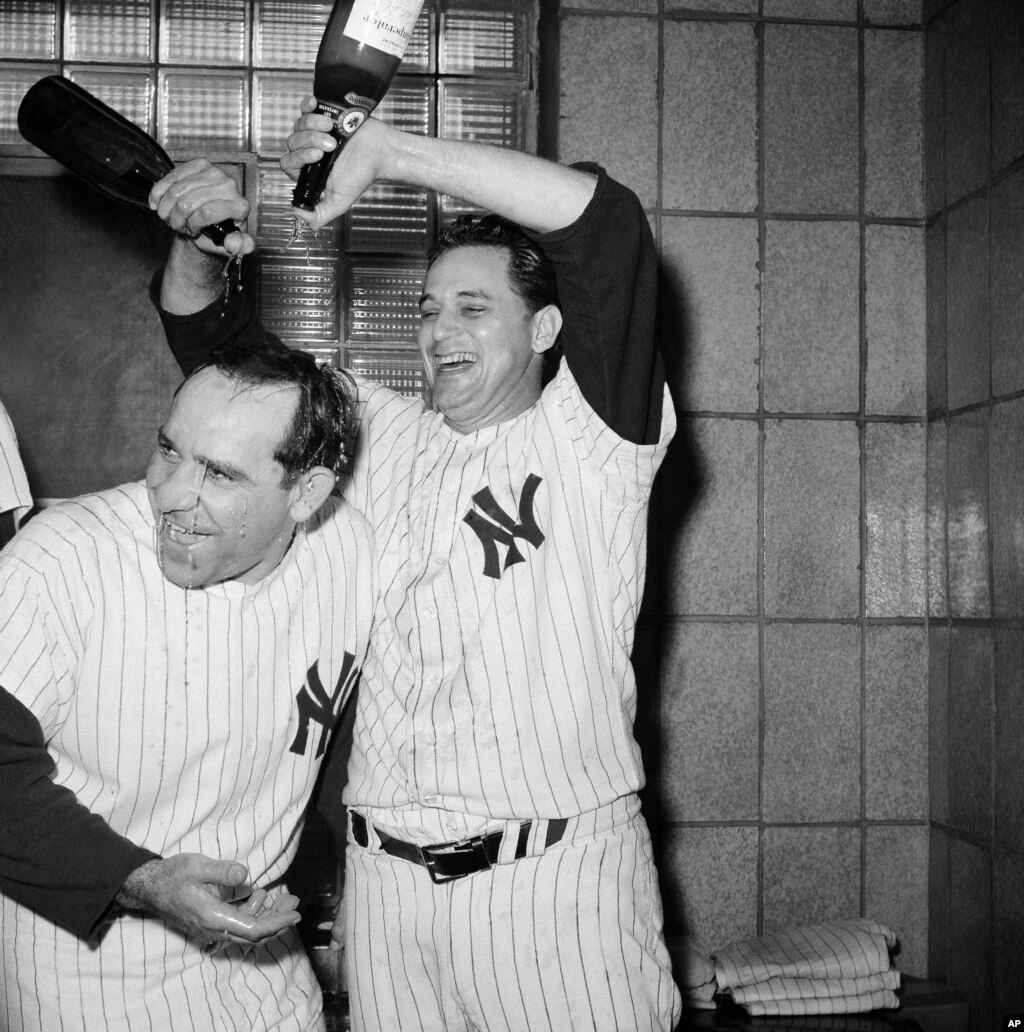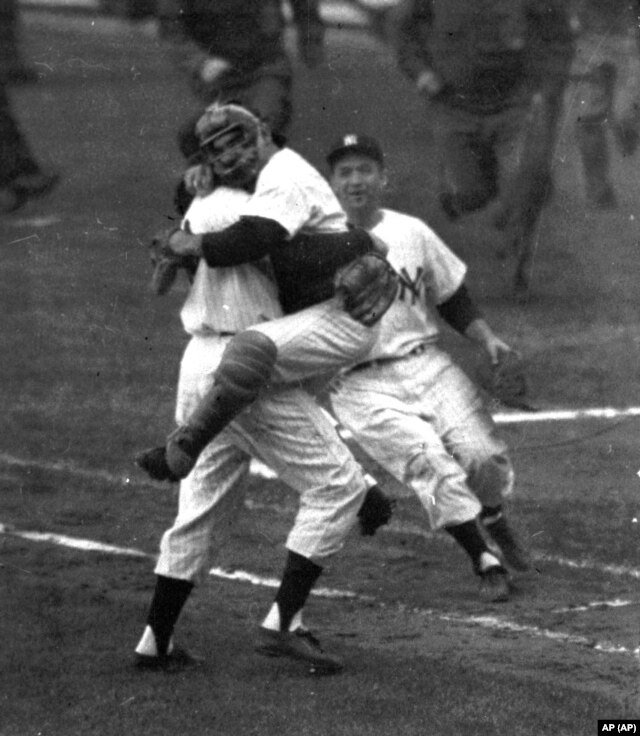
Yogi Berra – a baseball catcher who later managed the ever-winning New York Yankees -- died Tuesday. He was 90.
Yogi Berra was short, thick and had a plain face. But he was a legendary member of the Yankees baseball team. He helped the team reach 14 World Series during his 18 seasons with the team.
Berra played in more World Series games than any other major league player. He was chosen Most Valuable Player for the American League three times.
Berra played for the Yankees from 1949 through 1963. He played for the New York Mets in 1965. His teammates were famous for their athletic baseball talent: Joe DiMaggio, Mickey Mantle and Whitey Ford.
In 1956, he was the catcher behind the plate in the only perfect game in World Series history. When the last play ended, he leaped into pitcher Don Larsen's arms. The famous moment was captured in photographs published in newspapers around the world.

After he stopped playing baseball, Berra was a coach or manager for the Yankees, New York Mets and Houston Astros. He led both the Yankees and Mets to pennants, the step just before the World Series.
Yogi Berra’s special way of speaking
Berra became as famous for how he spoke as his baseball talent. His name appears almost as often in “Bartlett's Famous Quotations” as it does in baseball's record books. Bartlett’s is a collection of well-known phrases and proverbs.
"It ain't over 'til it's over," is one of eight "Yogi-isms" included in Bartlett's.
Another of his famous expressions was “This is like déjà vu all over again.” Déjà vu is the feeling that you’ve experienced a moment in time more than once. It feels as if you’ve seen the exact same thing before. Yogi Berra used it when he watched Mickey Mantle and Roger Maris hit home runs over and over in the 1960s.
"When I'm sittin' down to dinner with the family, stuff just pops out,” Berra said in an interview. “And they'll say, 'Dad, you just said another one.' And I don't even know what the heck I said!"
He amused TV viewers in recent years by using his malapropisms, or mixed-up words, on an advertisement for an insurance company.
“They give you cash,” says a duck, “which is just as good as money."
Cash is money. It usually takes a second to realize Berra fooled you for a moment or two.
Yogi Berra, the philosopher
Some called Yogi Berra “the philosopher of baseball.” He gave good advice about life. “You can observe a lot by just watching.” Since “observe” means to watch, he probably meant that you could learn much by watching.
He once said, “Always go to other people’s funerals, otherwise they won’t come to yours.” Since a funeral is a ceremony for someone who has died, it would be impossible for that person to attend someone else’s funeral. But he was right that he gained the good will of friends by attending important events with them.
Mr. Berra’s wisdom included, "If you don't know where you are going, you will wind up somewhere else." This means that it is good to know your direction in life. If you don’t have a clear image of your goal, you will not achieve much in your life.
While his expressions seemed simple-minded, they carried a lot of wisdom. "When you come to a fork in the road, take it," he said. A fork in the road means you have a decision to make. When the time comes to make a choice, pick a direction and go forward, Berra meant.
Other Yogi-isms were:
"The other teams could make trouble for us if they win.”
"It ain't over 'til it's over."
Sometimes people thought Yogi Berra said clever expressions that someone else said. His comment on that was, "I didn't really say everything I said."
His unusual nickname
Berra was the son of Italian immigrants. He got his nickname, “Yogi” while growing up in St. Louis, from a character in a movie.

He was a fan favorite, especially with children, and a popular cartoon character of the 1960s, “Yogi Bear,” was named after him.
Son of Italian immigrants
His real name was Lawrence Peter Berra. He was born May 12, 1925. Berra left school in the eighth grade to work to help support his family. He took jobs in a coal yard, as a truck driver and in a shoe factory.
He played amateur baseball before scouts from major league teams found him. He played with a semi-professional team in 1943, until World War II.
He joined the Navy and served on a gunboat on a major invasion called D-Day. Troops landed on the coast of France to fight the Nazis.
In 1946, he played for the Yankees’ professional team. He hit a home run the first time he stepped up to bat.
He was inducted into the Hall of Fame in 1972.
"You never think of that when you're a kid," Berra said. "But egads, you gotta be somethin' to get in."
Berra married his wife, Carmen, in 1949. They had three sons, including Dale Berra, who played in the major leagues as an infielder.
He published three books that were very popular. In 1996, he was awarded an honorary doctorate degree from the state university in Montclair, N.J., where he and his family lived. The baseball stadium there is named for him. The Yogi Berra Museum opened beside the stadium in 1998.
His wife once asked him where he wanted to be buried: In St. Louis, New York or Montclair?
"I don't know," he said. "Why don't you surprise me?"
I’m Jim Tedder.
Dr. Jill Robbins wrote this story for Learning English based on an Associated Press story and other sources. Kathleen Struck was the editor.
Words in This Story
legendary – adj. always used before a noun : told about in a legend
season – n. a period of time when a particular sport is being played
pennant – n. the last few weeks of the regular American professional baseball season are known as a pennant race (pennants are flags used to show support of a team)
déjà vu – n. a feeling of having already experienced the present situation.
home run – n. a hit that allows the batter to go around all the bases and score a “run” in baseball
malapropisms - n. an amusing error that occurs when a person mistakenly uses a word that sounds like another word but that has a very different meaning
mental – adj. existing or happening in the mind
induct – v. to officially make (someone) a member of a group or organization
amateur – adj. describing the act of doing something (such as a sport or hobby) for pleasure and not as a job
mitt – n. (baseball) a special type of heavy glove worn by the catcher
Now it’s your turn. What do you think of Yogi Berra’s expressions? Is there a famous person in your culture who said many memorable expressions?